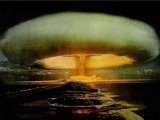
Our friend Martini, a veteran from many battles against nuclear weapons testing, has sent us the reference of a piece "The Observer" has just published which contains a preview of the results from an all-party French Polynesia Assembly Committee that will publish findings into claims that French nuclear tests in Moruroa and Fangataufa in French Polynesia, are causing fatalities and severe long-term health problems.
"Local opponents have consistently blamed nuclear tests for the region's chronic levels of leukaemia and other cancers. They believe they will be vindicated by the forthcoming report and establish that France, for years, has engaged in an elaborate cover-up. They also claim Paris was aware of the health risks when testing began in 1966", says The Observer. "Strong evidence has emerged to support this assertion. But France, which teamed up last summer with Assembly supporters in an abortive challenge to the legality of the all-party inquiry, continues to deny it is culpable. 'We are now getting more than 600 cases of cancer a year and more than 250 deaths because of these tests,' says Roland Oldham, president of Mururoa e Tatou, the association of former Mururoa workers. 'There are 31 possible cancers linked with nuclear matter and some can take 20 to 30 years to develop. This is why they are showing up now. Research in Japan even suggests that some cancers can be transmitted genetically,' he says".
Ah ah, so the truth shows up ten years after the dust settled? Exactly ten years ago, in January 1996 the last of France's 200 nuclear tests in French Polynesia took place, amid huge controversies in which I took part.
Unfortunately the fact that past nuclear tests are causing cancers and deaths is not real news, though of course local populations (and especially the victims, their parents and their friends) have a right to know and to be compensated: I remember very well that in 1995, in the midst of the worldwide controversy which surrounded France's decision to resume nuclear testing momentarily, Jacques Chirac en personne recognized in a talk-show on French television, that the past atmospheric test series had been "très polluantes". Atmospheric testing in Polynesia stopped in 1974, and the point that Chirac was trying to make was that the underground tests which France was conducting at the time were no big deal.
I remember that in the wake of Chirac's TV prime-time confession, I commented on behalf of Greenpeace that if one day in the future the radioactivity from underground tests surfaces, it would be too late to be sorry. Like it was -- in some way -- too late for Chirac to be sorry for the effects of atmospheric tests. After all, wasn't it exactly the same institutions, exactly the same scientists, exactly the same politicians who had been saying for years that atmospheric testing was safe, who were now saying that underground testing was too? This controversy was taking place only three years after the Rio Earth Summit had endorsed the precautionary principle. I think that -- even if we were preaching in a radioactive desert at the time in Paris, we certainly had a point.
Now, the dust has settled. France supported and signed the Comprehensive Nuclear Test Ban Treaty in 1996, and ratified it. But for the victims, Life goes on. And Death.

No comments:
Post a Comment